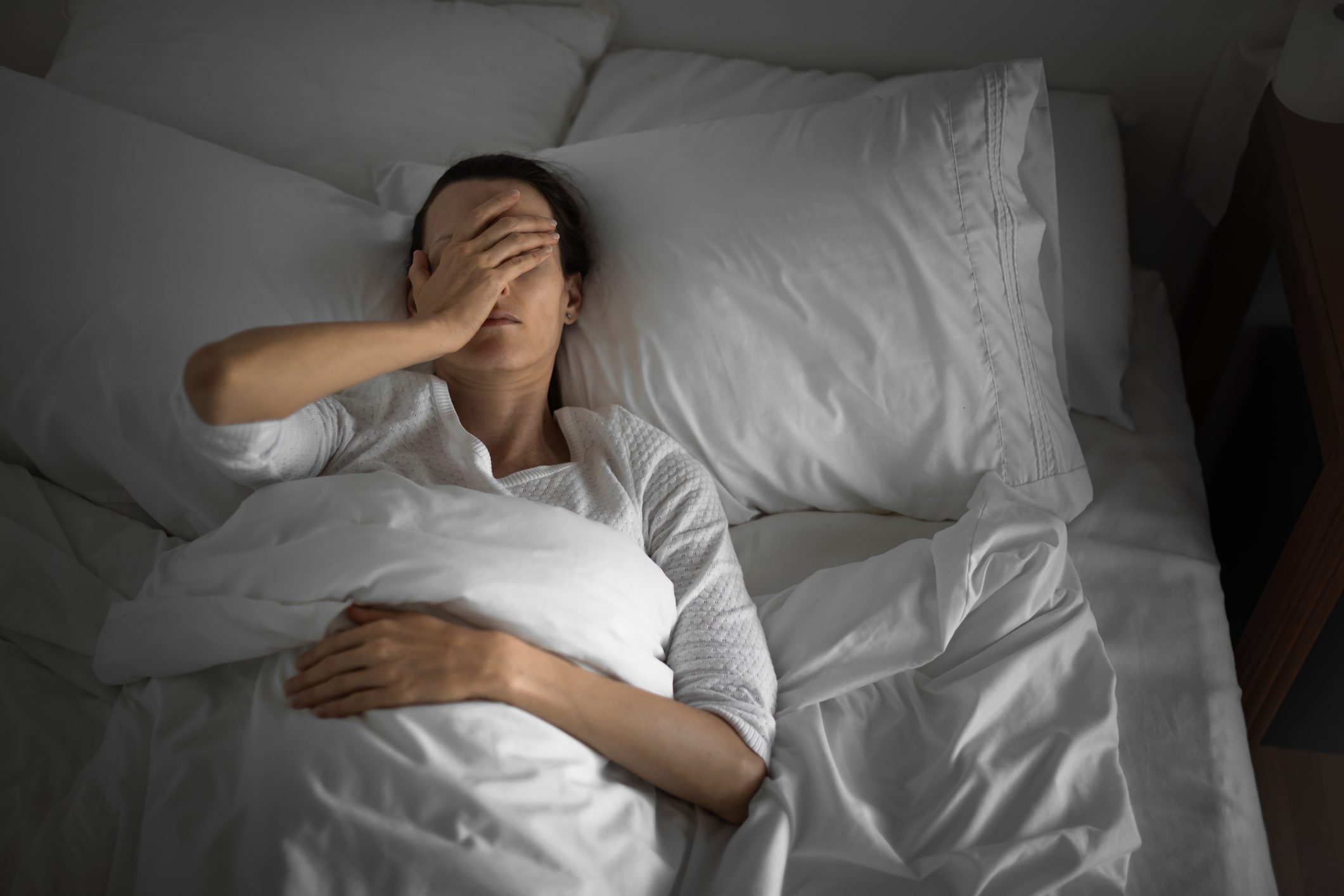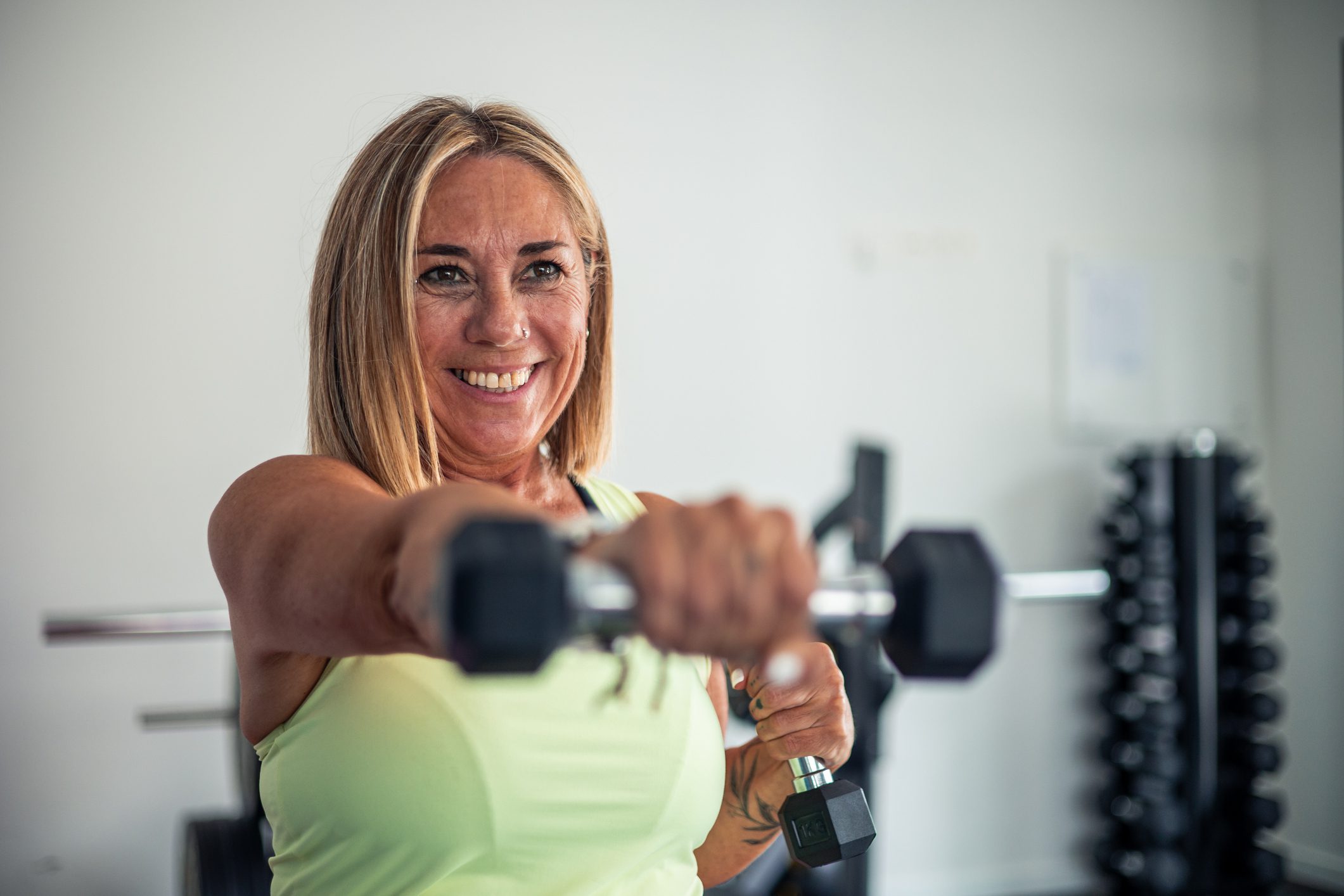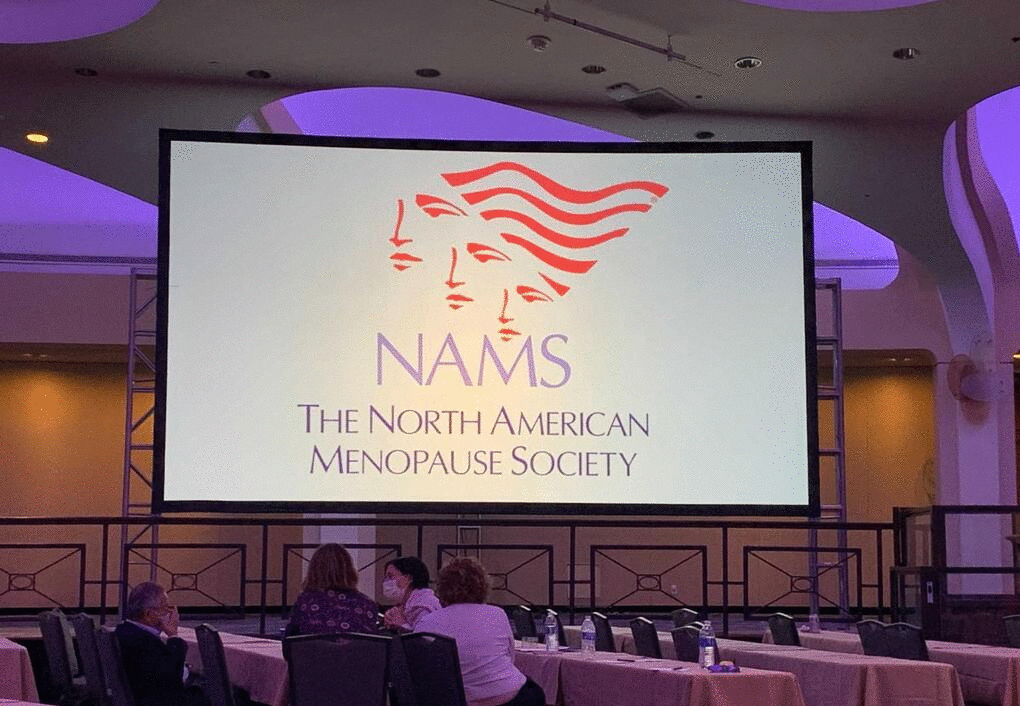
Published on Sep 28, 2021
Last modified on Oct 20, 2021
5 Cutting-Edge Research Developments from the 2021 North American Menopause Society Conference

Last week, Team Elektra attended the 2021 North American Menopause Society (NAMS) Annual Conference in Washington, DC!
What exactly goes on at this conference, you ask? Think of it as the Woodstock for menopause where top experts from around the world gather to celebrate and advance menopause research. And rather than passing around joints, we discussed the potential benefits of cannabis on menopause symptoms.
Out of the many of incredible presentations and talks, we gathered our top 5 menopause research takeaways for our Elektra Community members:
#1: It’s not over till the “fat” lady sings
We all think of opera singers when we hear this colloquial phrase. But did you know that the phrase could also refer to menopause?
In a discussion led by gynecologist Cheryl Cox Kinney, MD, we learned that estrogen is actually responsible for the suppleness of vocal cords!
In our Menopause 101 guide, we explain how estrogen is not only produced by our ovaries, but also by the conversion of peripheral fat cells in our bodies. After menopause, this process helps us gain estrogen and prevent vocal changes (primarily a deepening of the voice). Given this, singers are often concerned about how menopause may impact their careers. In fact, the careers of some vocalists have been ruined because they lost TOO much weight.
One solution: many vocalists choose to take hormone replacement therapy, often for the duration of their careers.
#2 Making headway on hormonal hair loss
Hair loss, perhaps one of the more distressing symptoms of menopause, is often related to hormonal changes. The most commonly diagnosed type of hair loss is known as androgenetic alopecia (AGA) and can affect an estimated 40% of women over the age of 60.
Historically, research and effective treatments for hair thinning in women have been lacking, leaving some to turn to unconventional and unproven therapies. Thankfully, we learned about a few exciting advances in hair loss research.
A robust study recently published in the Journal of Drugs in Dermatology revealed that a common supplement known as Nutrafol, showed significant improvements in hair growth over a 12-month period in 60 perimenopausal and postmenopausal women.
Interested in additional options? We also learned that treatments including minoxidil 5% foam and/or oral tablets, spironolactone, finasteride, collagen, and even PRP (platelet-rich plasma) scalp injections work for some.
If all else fails, seek consultation from a dermatologist who understands the importance of hormones on hair loss in menopause.
#3 Cannabis for menopause: not just smoke and mirrors
Everyday, we are hearing that more women are turning to cannabis to manage their health and wellness in midlife. In order to better understand this phenomenon, researchers in Canada surveyed 1,500 pre-, peri-, and postmenopausal women about their cannabis use. Out of nearly 500 women who reported using cannabis, 75% noted it was for medical use to manage common symptoms such as pain, sleep, and mood.
But did it actually help? Researchers went on to find that the women who reported using cannabis were indeed less likely to be symptomatic. While most of these women sought information on cannabis from the internet, friends, and family members, they desired to learn about this topic from their physicians. As cannabis legalization continues to spread in the US, we can expect that more and more women will be interested in its effects on treating manage menopausal symptoms.
In order for medical providers to increase their knowledge as a trusted partner for their menopausal patients, more research is needed.
#4 Social connectedness = wellness
Unsurprisingly, social connection was one of things women missed during the pandemic. In addition to being a source of fun and joy, researchers are discovering that our social networks are vital to our health and wellbeing. In a riveting talk, Julianne Holt-Lunstad, PhD discussed her research showing that social isolation and loneliness led to increases in earlier death by 26-29%. The effects of social connection on long term health and wellness are on par or exceed risk factors like smoking, obesity and lack of physical activity!
Why is social isolation a risk? The emotional impact of loneliness can actually trigger our nervous system and ramp up our body’s inflammatory response, which can lead to disease. We also learned that those who are more socially connected are more likely to have a healthy immune response to a vaccine!
As a society, we need to take our social relationships far more seriously than we currently do. So take that walk with a friend, give your sister a call, or go to that party! Consider it a prescription for your health.
#5 Fix your “WASO”
Waking up repeatedly during the night is a classic problem during menopause that affects the large majority of our patients. Evidence continues to mount, showing that interrupted sleep has major health consequences: depressed mood, weight gain, cardiovascular disease, and sexual health issues, and an overall decrease in well-being.
Researchers at Harvard Medical School and Brigham and Women’s Hospital in Boston set out to understand the relationship between fragmented sleep, total sleep time, sleep quality, and daytime sleepiness in menopausal women. Hadine Joffe, MD, MSc and her team of researchers coined the term “WASO” (Wake Time after Sleep Onset) in this study. During her poster presentation at NAMS, we learned that more WASO leads to decreased sleep quality and more daytime sleepiness, even when the women had a normal total sleep time. We also learned that lack of estrogen alone was NOT a factor in sleep quality and did not affect WASO.
What does all this mean?
- It’s better for your health to get 5 hours of solid, uninterrupted, high quality sleep versus 8 or 9 hours of fragmented sleep.
- It could also be assumed that even women in menopause are capable of getting a great night’s sleep.
SO, how do we fix our WASO? Unfortunately, there isn’t a magic bullet. But a great place to start is our 21st Century Guide to Menopause Sleep section for some great ways to improve your Zzzs.
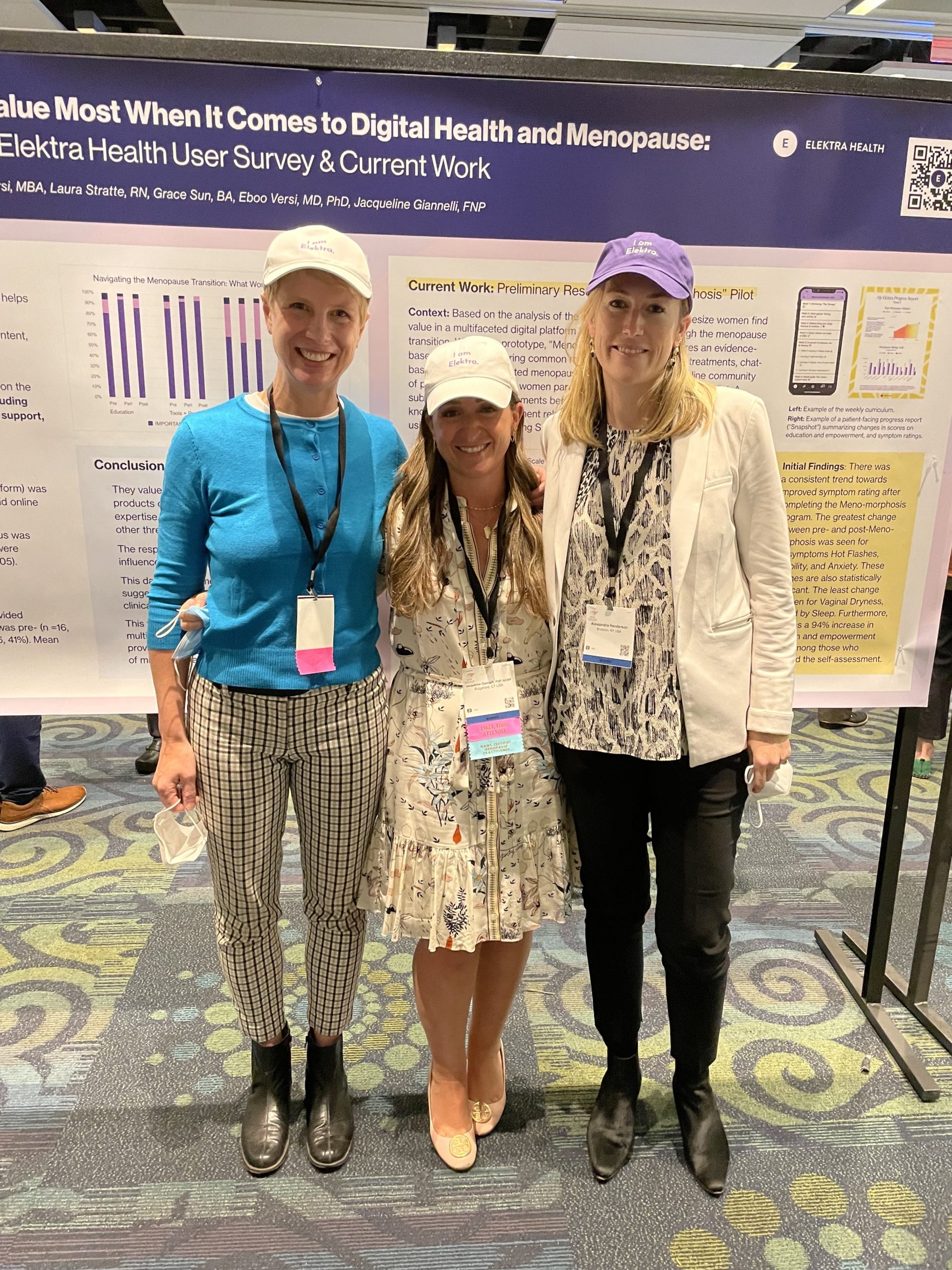
Elektra at NAMS
The Elektra Team in front of our scientific poster which we presented at this year’s NAMS conference on what women value the most when it comes to digital health and menopause.
Stay tuned for more information on what our research team discovered!
WHAT ELSE WE’RE READING
How one woman navigated the controversial world of testosterone pellets for menopause symptoms.
These 4 hilarious comedians over 40 tested their vagina knowledge (we’ve never laughed about vaginal atrophy before, but there’s a first time for everything!).
Is cannabis for menopause just smoke and mirrors? Experts chime in.
A petition to change the names of all of these female body parts named after men to women’s names, starting with the G-spot!
HEALTHY OBSESSIONS*
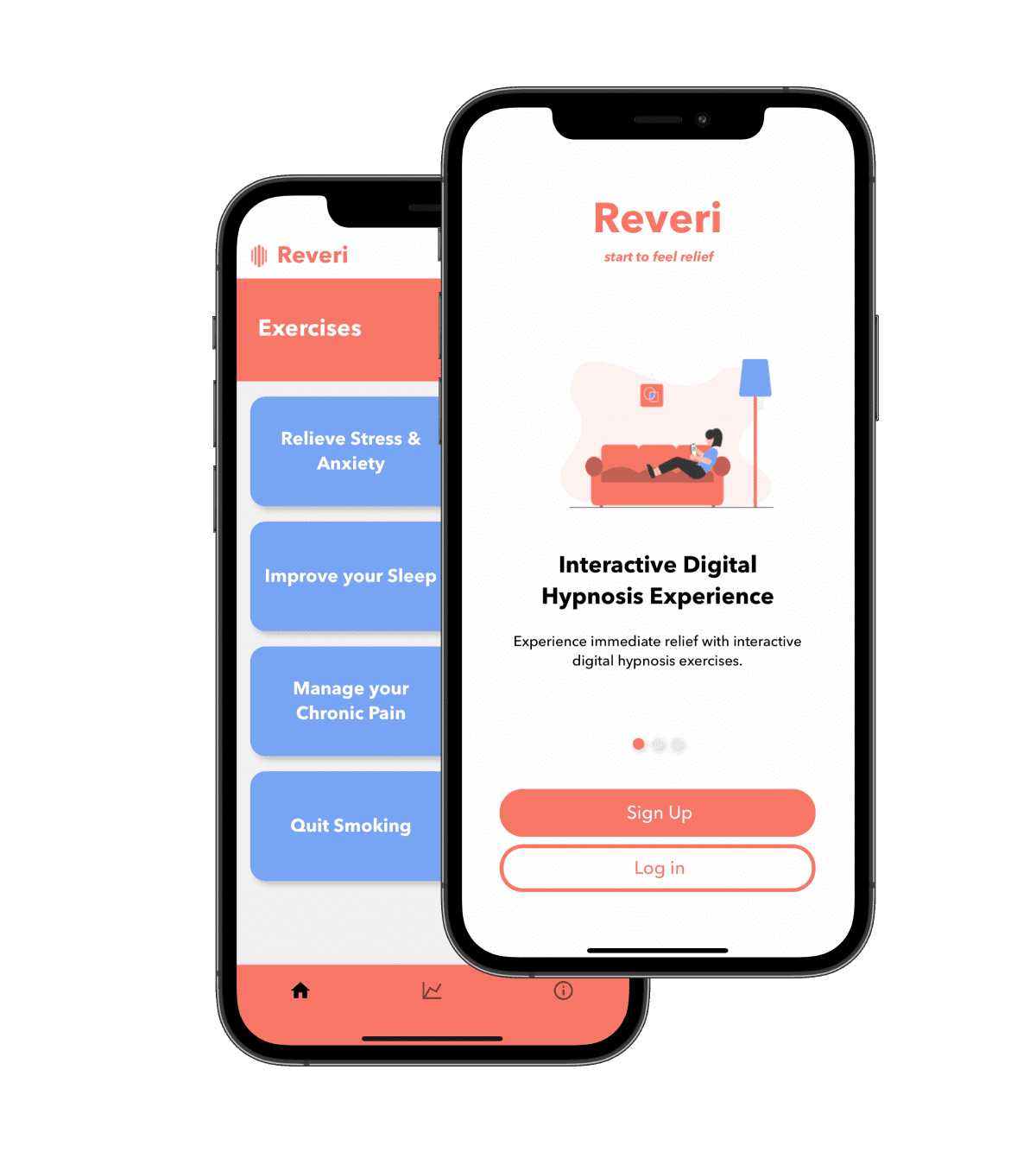
A free, self-guided hypnosis app for sleep, anxiety, chronic pain, and more, created by a top Stanford researcher.
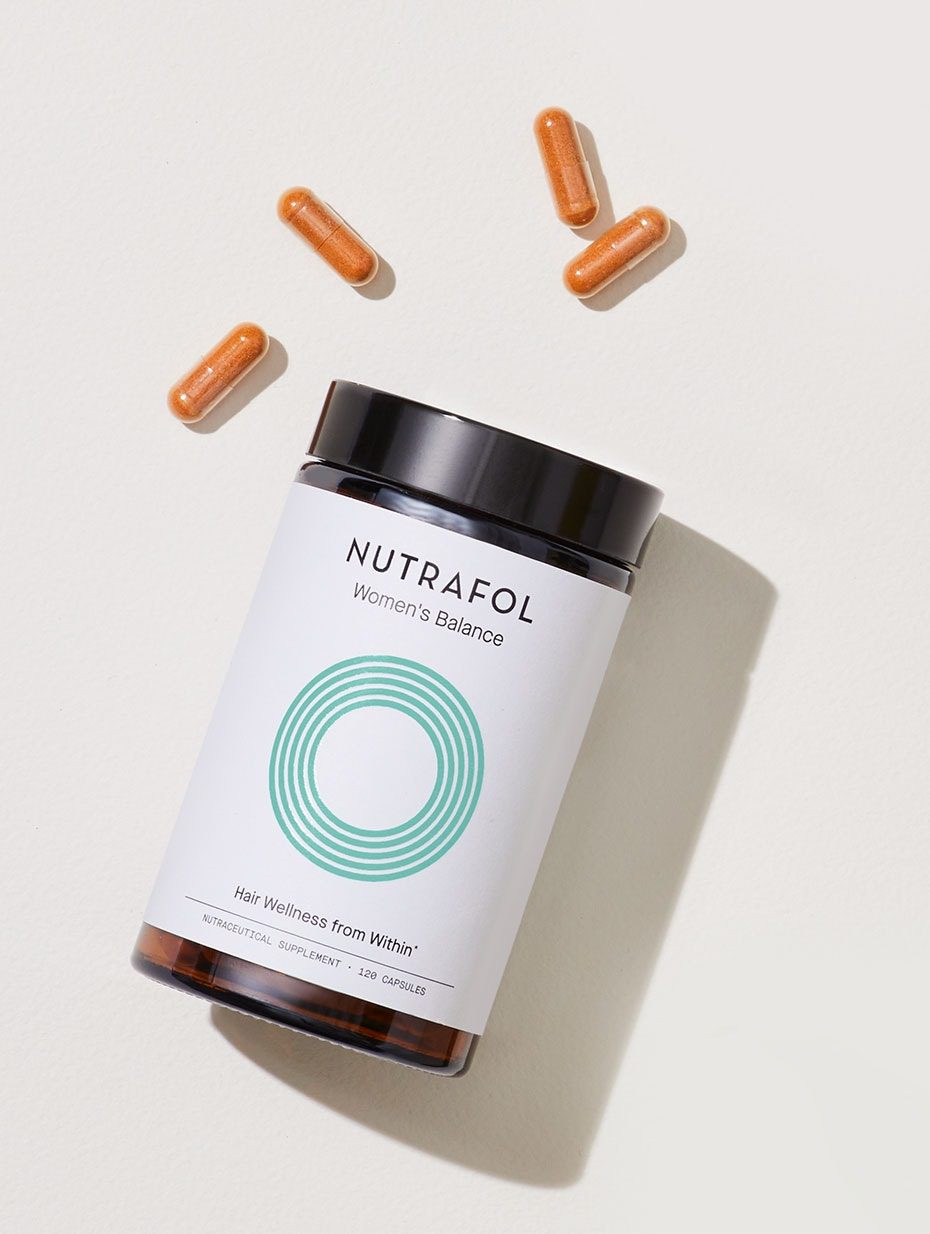
Nutrafol hair growth supplements
A research-backed supplement for dealing with frustrating perimenopausal and postmenopausaul hair loss.
* We’re not paid to feature these products. We just like them and think you may like them too.
KEEP CALM AND ELEKTRA ON


